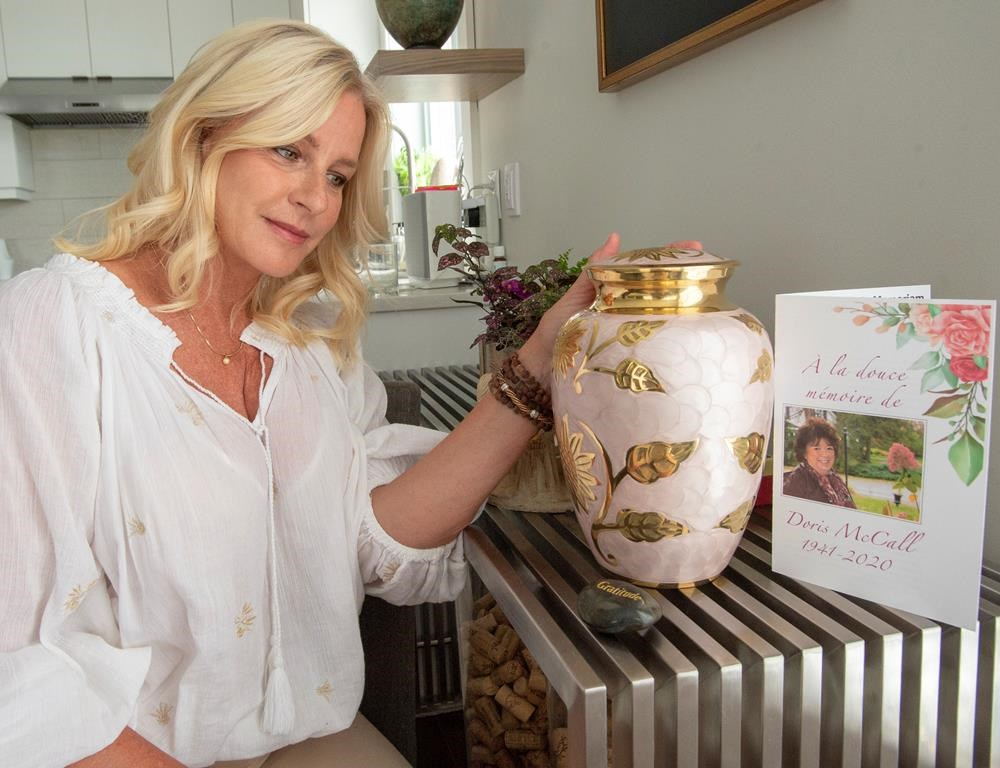Support strong Canadian climate journalism for 2025
July Mak spent nearly every night with her father, Paul.
Because he was plagued by health problems, including a stroke that left him unable to walk on his own, the family decided to put her father in a long-term care facility in Montreal over a decade ago, Mak said.
That's where the 68-year-old contracted the novel coronavirus and died at the end of March.
"What if we didn't place him there? Maybe he could have survived this," Mak said in a recent interview.
Those feelings of guilt and anger over the circumstances surrounding her father's death have made the mourning process difficult.
"I still can't believe he's gone. I just can't believe it, because there's no closure," she said. "There (are) a lot of questions that come up during the process of mourning."
Mak is among thousands of people grieving the loss of a loved one from COVID-19 across Quebec, which has recorded more than half of all the COVID-19 cases and deaths in Canada. The province's long-term care homes, known as CHSLDs, have become the epicentre of the outbreak.
The province recorded more than 50,000 confirmed cases and over 4,300 deaths as of Friday. Close to two-thirds of those deaths have happened in long-term care facilities, according to government statistics.
The grieving process itself has been complicated by the ongoing crisis, and many Quebec families are still struggling to honour their loved ones amid ongoing restrictions on large gatherings and essential services, such as funerals.
Nathalie Viens, co-ordinator at Monbourquette Bereavement Training at the Universite de Montreal, says many people were unprepared to deal with the deaths because COVID-19 hit so quickly and without warning.
"When you don't have this preparation ... the shock and the denial stage are more intense, and it's going to take longer for you to realize (your loved one is) really dead," Viens said.
Rules around social distancing have also made it difficult for people to get the in-person support and comfort they would normally get after the death of a loved one, Viens said.
Deborah Ward said she luckily was able to talk to her mother, Doris McCall, about what type of funeral she wanted shortly before she died.
McCall chose some favourite music she wanted to have played — Nat King Cole and Edith Piaf — and Ward said she promised she would hold her mother's hand in her final moments.
But when Ward received a phone call from the hospital on April 1 telling her that her mother was dying — she had contracted COVID-19 in a CHSLD on Montreal's West Island — Ward said she realized those plans would not pan out.
Instead, Ward and her children lit a candle and tightly held hands at their home in Boucherville, about 35 kilometres from the hospital her mother was in, while thinking of McCall. The act was comforting, Ward said.
"It was about letting her know that we are there with her as best as we can be. We let the candle burn out and then I got a call and the doctor said that she had passed."
With so many COVID-19 deaths in the province, the Quebec government in late April announced a program to provide support for bereaved families.
It invested $240,000 to bolster the work of helplines for adults and youth and provide people who lost loved ones with up to three private support sessions free of charge.
Some families affected by COVID-19 have also used social media to share their grief and send condolences to one another.
A public Facebook group for people who have loved ones at CHSLD Sainte-Dorothee, a hard-hit facility in Laval, counts dozens of messages.
"I am living this mourning alone," reads one.
"The call I feared came last night. My aunt died from this cursed virus," reads another.
Viens at the Universite de Montreal said talking about what happened is an important step in the grieving process, and she encouraged people to reach out for help if they need it.
But for Christian Lapointe, whose father Romeo died of COVID-19 in early April at a Montreal CHSLD, it feels as though the mourning process has yet to really begin.
Lapointe said he was told his father was not feeling well on April 6. The 77-year-old tested positive for COVID-19 the next day. The day after that, he was dead.
"It was very violent, extremely quick, and completely out of our control," Lapointe said.
Romeo, who suffered from Alzheimer's disease, had been moved into the long-term care home only two months before his death.
The family could not go to the morgue to identify his body, they could not be with him in his final hours, and they have not yet held a funeral, Lapointe said.
"I feel like it's not really mourning. It's like time is going by, and eventually it will become a real period of mourning," he said. "But right now, it's as if we're just waiting."
This report by The Canadian Press was first published May 31, 2020.





Comments